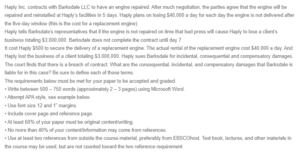Contractual Remedies – Haply Inc. and Barksdale LLC
Haply, Inc. and Barksdale LLC are in a business contract to fix a broken engine. The engine is to be installed at Haply in five days. For every day that Haply does not have an engine, they have to rent one at $40,000. This cost will continue to be incurred for each day that the engine is not delivered. Barksdale LLC’s failure to complete the contract in 7 days could cause the loss of a client worth $3,000,000 due to bad publicity. Additionally, it cost Haply $500 to have the replacement engine delivered. Barksdale fails to fulfill its contractual duties, and a court finds it guilty of a breach of contract. They are sued for consequential, incidental, and compensatory damages. This essay evaluates these types of damages to determine the damages for which Barksdale will be liable.
Consequential Damages
Consequential damages, also referred to as special damages, are the types of damages proven to have occurred as a result of one contractual party’s failure to meet their obligations as set in the contract (O’Malley, 2009). These damages go beyond the contract itself but also losses that have been caused as a result of factors that would not have occurred if the contractual duties were fulfilled. In this case, the consequential costs include the loss incurred from the lost client as a result of the bad publicity caused by Barksdale’s inability to deliver the engine in 7 days as required. This cost is not necessarily direct to the contract, but it is a result of Barksdale’s breaching of the contract; thus, it is a consequence of their actions.
Incidental Damages
Incidental damages refer to a seller’s reasonable commercial expenses that have been incurred because of the failure of another contractual party’s delivery of the product. These are reasonable damages that are associated with the actual damages caused by the failure to honor the promises made in the contract (O’Malley, 2009). The incidental damages prevent the breaching party from paying unreasonable costs of money for breaching the contract (Roberts, 2008).
In this case, the incidental damages include the costs of transporting the engine at $500 and the daily costs of using the replacement engine for five days at $40,000 per day. These are costs that are incidental in that the company would have incurred these costs whether Barksdale delivered the engine on time or not. The engine was to be delivered in five days, and the company was going to spend these costs whether or not Haply met their end of the bargain.
Compensatory Damages
Compensatory damages refers to the damages covering the losses of the non-breaching contract as a result of the breach of contract (O’Malley, 2009). The amount paid as the compensatory damage is paid to replace the loss caused by the breach. The compensatory damages in this case include the $40,000 daily costs of running the replacement engine every day after the five days that Barksdale was supposed to deliver the company’s repaired engine.
Conclusion
The total costs that Barksdale LLC will be required to pay Haply, Inc. is $3,000,000 and the $40,000 for every day after the five day period that they failed to deliver the machine. The company will not pay the incidental damages because they would have been incurred whether or not the contractual duties were fulfilled. The longer the company takes to deliver the engine, the more losses Haply will incur leading to more damages for Barksdale.
References
O’Malley, P. (2009). The currency of justice: fines and damages in consumer societies. Routledge-Cavendish.
Roberts, C. L. (2008). Restitutionary Disgorgement for Opportunistic Breach of Contract and Mitigation of Damages. Loy. LAL Rev., 42, 131.
ORDER A PLAGIARISM-FREE PAPER HERE
We’ll write everything from scratch
Question 

Contractual Remedies
Haply Inc. contracts with Barksdale LLC to have an engine repaired. After much negotiation, the parties agree that the engine will be repaired and reinstalled at Haply’s facilities in 5 days. Haply plans on losing $40,000 a day for each day the engine is not delivered after the five-day window (this is the cost for a replacement engine).
Haply tells Barksdale’s representatives that if the engine is not repaired on time that bad press will cause Haply to lose a client’s business totaling $3,000,000. Barksdale does not complete the contract until day 7.
It cost Haply $500 to secure the delivery of a replacement engine. The actual rental of the replacement engine cost $40,000 a day. And Haply lost the business of a client totaling $3,000,000. Haply sues Barksdale for incidental, consequential and compensatory damages. The court finds that there is a breach of contract. What are the consequential, incidental, and compensatory damages that Barksdale is liable for in this case? Be sure to define each of those terms.
The requirements below must be met for your paper to be accepted and graded:
• Write between 500 – 750 words (approximately 2 – 3 pages) using Microsoft Word.
• Attempt APA style, see example below.
• Use font size 12 and 1” margins.
• Include cover page and reference page.
• At least 60% of your paper must be original content/writing.
• No more than 40% of your content/information may come from references.
• Use at least two references from outside the course material, preferably from EBSCOhost. Text book, lectures, and other materials in the course may be used, but are not counted toward the two reference requirement.